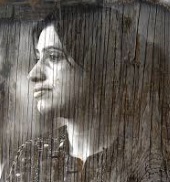Attiya Dawood

Birth—1958
|
Bold, different, defiant, feminist… Attiya Dawood is the new and exciting voice in Sindhi poetry. A voice suggesting new choices, drawing out powerful relationships, hinting at elusive mysteries. Choose love, she writes in a poem addressed to her daughter, even if “they” condemn you to be a “kari”, the blackend woman. Do not let love turn into a collar around the neck of slave, she writes in another poem, but you should also eat the fruit of knowledge, then our love will be like flowers and fragrance. Do not talk to me just as you talk to your friends. I weigh heavy on shoulders of father, brother, husband, son… bathed in the name of religion, nailed to the coffin in the name of traditions, I am buried in the graveyard of ignorance. All my life I kept walking on the “Pul Sarat” respectability built by others. I hve traveled across centuries to know myself. You cannot keep this voice locked up inside the “kot”, it will not be silenced. It announces firmly that “my hands reach out the door latch
Slowly a trembling hand moves towards the heavily barricaded doors. This gesture does not come easily. In one of her poems, Attiya Dawood writes that beliefs were written “throttling my mind and dipped in my blood”, laws were framed “assuming my status as a sub-human” and society built on “the skuls of what were once my ambitions.” Coming out of the bacground of oppersive silence, solitary confinement in a “kot” and walking over the narrow “Pul Sarat”, Attiya Dawood is “the other voice” in Sindhi poetry. In her introduction to “The other Voice: Twentieth Century Women’s Poetry in Translation”, the iconoclast American women poet Adrien Rich speaks of “the great flowering, affecting the themselves available to women we are only now egining to know as materials and experiences becoming legitimized that were formerly discounted as women’s subject..therefore trivial or scandlous.” In Rich’s terms, Attiya Dawood is a “special woman”, since she is “one of those who some how found her voice and moved out to silence or the unwritten verbal tradition of women into the glare and vulnerability of print.” Attiya Dawood is acutely aware of this eerie silence. For each woman poet who has come into print, there are several others who are lost to silence. She has prepared interviews and write-ups on women writers and their problems, and she ruefully describes several instances. “One of them published her poetry under several fictitious names, all of them rather neutral sounding so as not to reveal the fact that she was a woman. She became a recluse”, she narrated to me. “I know some young girls who were forbidden by their fathers or brothers from writing, even though they came from educated families”, she recites a poem and mentions that it was frowned upon by the girl’s brother. The journey has not been an easy one for Attiya herself. When the poem addressed to her daughter asking her to choose love above all was published on the literary page of a newspaper, there was a flurry of angry, protesting letters. Attiya is not intimidated by controversies and can defend the feminist stance of her poems as the proper subject for poetry. “There are some of my friends who say that it was all right for you to write about other things”, she laughs as she has no intention of following this or any other advice. She feels that she has not acquired a “fashionable” idea which can be adopted as a “politically correct pose”, but she is writing about what she passionately believes in, and passion is at the heart of poetry. Attiya Dawood was born in a small village called Moledino Larik near Kandiaro in district Naushehro Feroze, but has spent many years in Karachi where she currently works at an office job. She is married to Khuda Bux Abro, a well-known painter and graphic designer, and is the mother of two daughters. She combines her personal and family life with her work as writer and poet. She does not have a prolific output and her poems can be contained in a volume as slim as this.
|
